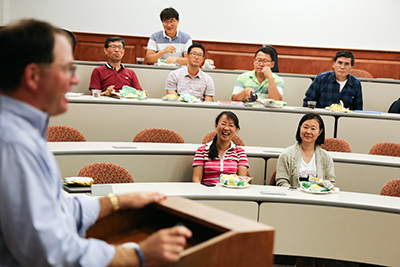Visiting Scholars Enrich William & Mary Law School Community
One of the great benefits of attending William & Mary Law School is the chance to study and learn alongside students and scholars who come from around the world as part of the Law School’s International Scholar-in-Residence program. Thanks to the diligent work of Law School librarians, visiting scholars are able to use the Wolf Law Library and all of its resources to dive deeper into their particular areas of interest and become acquainted with different language sources.

Some scholars, like Kimihiro Tsukagami, are on sabbatical looking to conduct comparative legal research. Tsukagami is a district court judge in Osaka, Japan. His court requires each judge to take a sabbatical to develop a broad perspective based on a diverse range of legal experiences. He is here for one year, spending half the time as a visiting scholar studying civil procedure and the management of civil cases, and the other half at the National Center for State Courts next door to the Law School.
Other scholars are doctoral candidates who seek to extend the breadth of their legal research. Xiaodan Ye is from Fuzhou University in China and is working on a Ph.D. in the areas of environmental law and economics. She learned of the program from friends and colleagues who had previously come to William & Mary as visiting scholars. Ye’s research focuses on a comparative study of environmental law in China and the United States.
Weiwei Gao is a Ph.D. student visiting for six months from Nanjing Normal University in Jiangsu Province, China. He studies and conducts research on defeasibility in the law and is interested in studying it from an international perspective. Gao thanks Professor Michael Green for assistance in helping connect him to William & Mary. Gao has translated two American legal articles into Mandarin that have been published in China and is working on more translations during his time here.
However, scholars do not come just to conduct research on their own. What makes William & Mary’s program unique is its strong institutionalized aspect. As heads of the program, Professor Ronald Rosenberg and Professor Jennifer Stevenson directly support the scholars with instrumental help of the law librarians. They give feedback to the scholars and offer perspectives on matters such as how U.S. law interacts with society, politics and culture, as well as the cultural origins for certain laws and canons of construction. On occasion, the program allows students to observe proceedings at the Hampton Circuit courtroom of Judge Wilford Taylor ’78 , which proves particularly informative for those scholars whose countries do not regularly use the jury system.
In addition, scholars attend guest lectures and events that are held on campus. One such event was a talk that Donald Verrilli, Jr., former Solicitor General during the Obama Administration, gave on campus ahead of the Law School’s annual Supreme Court Preview in September. Tsukagami appreciated learning about the Solicitor General’s role and its relation to the Supreme Court and Executive branch at this talk. Other scholars frequently can be found at faculty lectures on such areas of the law as criminal procedure (Professor Bellin), international criminal law (Professor Combs), and business law (Professor Ibrahim).
Of course, visiting scholars also get the chance to enjoy the greater Williamsburg area when they are here. One scholar remarked that he loves the local culture and finds Williamsburg to be a wonderful place. Others shared their interest in learning American history and about the American Revolution in Williamsburg and nearby Jamestown and Yorktown. The International Scholar-in-Residence program helps to enrich our law school community with the different legal perspectives and opportunities it brings together.
About William & Mary Law School
Thomas Jefferson founded William & Mary Law School in 1779 to train leaders for the new nation. Now in its third century, America's oldest law school continues its historic mission of educating citizen lawyers who are prepared both to lead and to serve.















